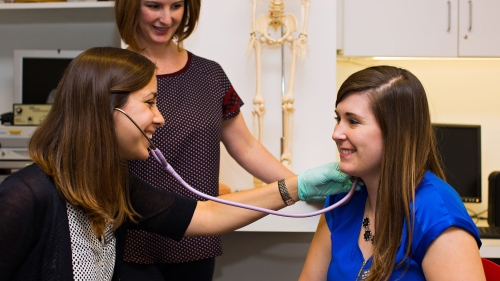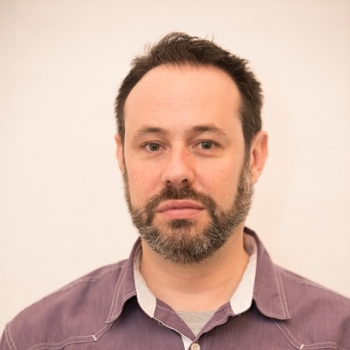

Adam Buchwald
Professor; Director, Center of Health and Rehabilitation Research
Communicative Sciences and Disorders
Center of Health and Rehabilitation Research
Adam Buchwald takes an interdisciplinary approach to understand speech and language production mechanisms, and how we can help individuals with impairment to these crucial abilities subsequent to stroke. To achieve these goals, Buchwald's research includes detailed studies of the performance and rehabilitation of neurologically impaired populations with acquired speech and language deficits (e.g., aphasia, apraxia of speech) as well as neurologically intact populations, and incorporates the research methods of several disciplines spanning methods from Communication Sciences and Disorders, Neurorehabilitation, Psycholinguistics, and Cognitive Science, and Neuroscience. Prior to coming to NYU in 2007, Buchwald completed his Ph.D. in the Department of Cognitive Science at Johns Hopkins University in 2005, and completed a two-year post doctoral fellowship in the Department of Psychological and Brain Sciences at Indiana University.
Selected Publications
- Buchwald, A. & Cheng, H-S*. (2023). Factors affecting non-native consonant cluster learning. Journal of Speech, Language, and Hearing Research. (link)
- Rimikis, S.*, Buchwald, A., & Miozzo, M. (2022). Morphophonological patterns influence regular and irregular past-tense production: Evidence from aphasia. Language, Cognition, and Neuroscience. (link)
- Segal, Y., Hitczenko, K., Goldrick, M., Buchwald, A., Roberts, A., & Keshet, J. (2022). DDKtor: Algorithms for Automatic DDK Analysis. InterSpeech. (link)
- Cheng, H-S.*, Niziolek, C., Buchwald, A. & McAllister, T. (2021). Examining the relationship between speech perception, production distinctness, and production variability. Frontiers in Human Neuroscience, 15(269).
- Cheng, H-S.* & Buchwald, A. (in press). Does voicing affect patterns of transfer in non-native cluster learning? Journal of Speech, Language, and Hearing Research, 64(6), 2103-2120.
- Buchwald, A., Khosa, N.*, Rimikis, S.* & Duncan, E.S. (2020). Behavioral and neural effects of tDCS on speech motor recovery: A single-subject intervention design. Brain and Language, 210, 1-7. (link)
- Buchwald, A., Calhoun, H., Rimikis, S., Steinberg Lowe, M, Wellner, R., & Edwards, D. (2019). Using tDCS to facilitate motor learning in speech production: The role of timing. Cortex, 111, 274-285. (link)
- Rimikis, S.* & Buchwald, A. (2019). Acquired morphological impairment impacted by morphophonological patterns in the language. Clinical Linguistics and Phonetics, 33(1-2), 68-94. (link)
- Buz, E., Buchwald, A., Fuchs, T., & Keshet, J. (2018). Assessing automatic phonetic annotation tools using unimpaired and impaired speech. International Journal of Speech-Language Pathology, 20(6), 624-634.
- Buchwald, A., Falconer, C.*, Rykman A., Cortes M., Pascual-Leone A., Thickbroom G.W., Krebs H., Fregni F., Gerber L.M., Oromendia C., Chang J., Volpe B.T., Edwards D.J. (2018). Robotic arm rehabilitation in chronic stroke patients with aphasia may promote speech and language recovery (but effect is not enhanced by supplementary tDCS). Frontiers in Neurology, 9, 853.
- Buchwald, A. (2017). Complexity in articulatory and segmental levels of production. Cognitive Neuropsychology, 34 (7-8), 488-492.
- Buchwald, A., Gagnon, B., & Miozzo, M. (2017). Identification and remediation of phonological and motor errors in acquired sound production impairment. Journal of Speech, Language, and Hearing Research, 60, 1726-1738.
- Steinberg Lowe, M.* & Buchwald, A. (2017). The impact of feedback frequency on performance in a novel speech motor task. Journal of Speech, Language, and Hearing Research, 60, 1712-1725.
- McAllister Byun, T., Buchwald, A. & Mizoguchi, A. (2016) Covert contrast in velar fronting: An acoustic and ultrasound study, Clinical Linguistics & Phonetics, 30(3-5), 249-276.
